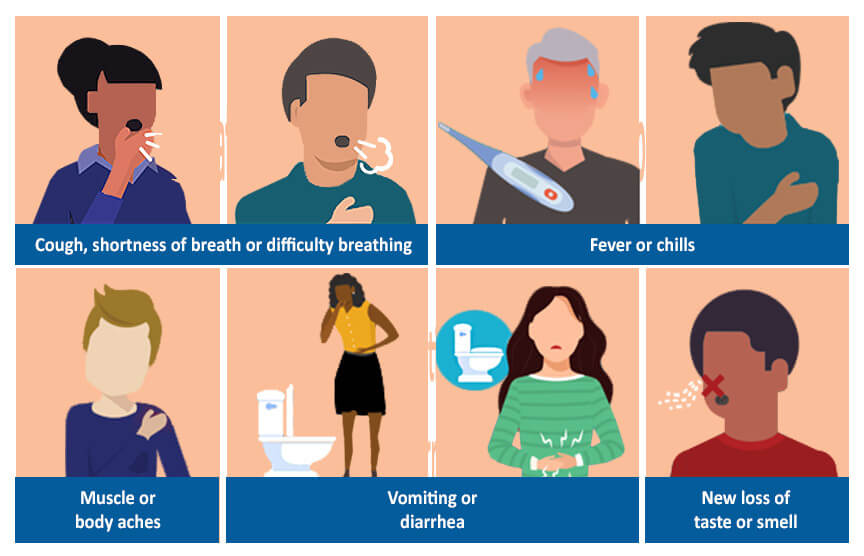What Are PsA and COVID-19?
COVID-19
Coronavirus disease 2019 (COVID-19) is a new infectious disease caused by the SARS-CoV-2 virus. Older adults and people with severe underlying medical conditions, such as heart or lung disease or diabetes, are at higher risk for developing more serious complications with COVID-19. However, anyone can have severe symptoms with COVID-19 that can lead to hospitalization or death.1
People with COVID-19 have a wide range of reported symptoms, from mild symptoms to severe illness. Symptoms may appear within 2 – 14 days after exposure to the virus. The most common symptoms of COVID-19 include fever, chills, shortness of breath, fatigue, muscle aches, headache, new loss of taste or smell, sore throat, congestion or runny nose, nausea, and diarrhea.1

CDC: https://www.cdc.gov/coronavirus/2019-ncov/downloads/COVID19-symptoms-24×36-en.pdf
Psoriatic Arthritis and COVID-19
Current research shows that COVID-19 symptoms are the same in patients with or without rheumatic diseases. A study of patients with and without rheumatic diseases who tested positive for COVID-19 in March and April of 2020 found that people who contracted the virus generally experienced similar symptoms (such as cough and fever) regardless of whether or not they had a rheumatic disease.2 Patients who develop symptoms of COVID-19 should seek testing and medical care. Some drugs used to treat psoriatic arthritis, such as prednisone and non-steroidal anti-inflammatory drugs (NSAIDs, such as ibuprofen, diclofenac, or naproxen), may block fever so these patients should look for other symptoms of COVID-19 infection.
More research is needed to determine if patients with PsA are at increased risk for contracting COVID-19 or developing severe disease. In one study, patients with rheumatic diseases were not any more likely to develop severe COVID-19 symptoms that required hospitalization than people without a rheumatic condition; nor were they any more likely to die from coronavirus. However, when patients with rheumatic disease did require hospitalization, they were three times more likely to require intensive care or mechanical ventilation.2 Other studies have found that patients with rheumatic disease are not at increased risk for death, invasive ventilation, or serious complications from COVID-19. Although rheumatic disease was not associated with severe disease in these studies, older age, male sex, and other health conditions (obesity, diabetes, hypertension, heart or lung disease) did increase the risk of serious complications.3,4
Do my medications increase the risk of COVID-19 infection?
Biologics used for the treatment of psoriatic arthritis reduce inflammation, treat symptoms, and prevent long-term damage to joints and organs. These medications are considered immunosuppressants because they work on the immune system to dampen the inflammation seen in PsA. Although biologics act on the immune system, there is no evidence that these medications make people with PsA more susceptible to coronavirus infection or increase the risk of severe complications. One study of patients with rheumatic disease and COVID-19 found that the use of disease modifying antirheumatic drugs (DMARDs) alone or in combination with biologics did not increase the risk of hospitalization. However, this study did find that prednisone use was associated with a higher risk of hospitalization.5
Stopping a biologic medication for PsA can lead to flares and further joint damage. You should speak with your healthcare provider about your treatment regimen. If you are otherwise healthy and are not infected with coronavirus, you can continue your biologic therapy. You may require a change to your regimen if you have COVID-19 symptoms at the time or your infusion of if you have had known exposure to someone with COVID-19. Speak with your healthcare provider immediately if you suspect you may have COVID-19.6
References
- https://www.cdc.gov/coronavirus/2019-ncov/symptoms-testing/symptoms.html
- D’Silva KM, Serling-Boyd N, Wallwork R, et al. Clinical characteristics and outcomes of patients with coronavirus disease 2019 (COVID-19) and rheumatic disease: A comparative cohort study from a US ‘hot spot’. Ann Rheum Dis. 2020;79:1156-1162.
- Fredi M, Cavazzana I, Moschetti L, et al. COVID-19 in patients with rheumatic disease in northern Italy: A single-centre observational and case-control study. Lancet Rheumatol. 2020;2:e549-e556.
- Pablos JL, Galindo M, Carmona L, et al. Clinical outcomes of hospitalized patients with COVID-19 and chronic inflammatory and autoimmune rheumatic diseases: a multicentric matched cohort study [published online ahead of print, 2020 Aug 12]. Ann Rheum Dis. 2020; 218296.
- Gianfrancesco M, Hyrich KL, Al-Adely S, et al. Characteristics associated with hospitalization for COVID-19 in people with rheumatic disease: Data from the COVID-19 Global Rheumatology Alliance physician-reported registry. Ann Rheum Dis. 2020; 79:859-866.
- Mikuls TR, Johnson SR, Fraenkel L, et al. American College of Rheumatology Guidance for the Management of Rheumatic Disease in Adult Patients During the COVID-19 Pandemic: Version 2. Arthritis Rheumatol. 2020;72:e1-e12.










